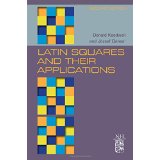 Donald Keedwell‘s 438 page book “Latin Squares and Their Applications“, co-authored with Jozsef Denes (Budapest), is published this month by North-Holland. A link to book on amazon is here. The book is the long-awaited update and reissue of the author’s seminal book on the subject from 1974. Latin squares, or sets of mutually orthogonal latin squares (MOLS), encode the incidence structure of finite geometries; they prescribe the order in which to apply the different treatments in designing an experiment in order to permit effective statistical analysis of the results; they produce optimal density error-correcting codes; they encapsulate the structure of finite groups and of more general algebraic objects known as quasigroups. As regards more recreational aspects of the subject, latin squares provide the most effective and efficient designs for many kinds of games tournaments and they are the templates for Sudoku puzzles. Also, they provide a number of ways of constructing magic squares, both simple magic squares and also ones with additional properties.
Donald Keedwell‘s 438 page book “Latin Squares and Their Applications“, co-authored with Jozsef Denes (Budapest), is published this month by North-Holland. A link to book on amazon is here. The book is the long-awaited update and reissue of the author’s seminal book on the subject from 1974. Latin squares, or sets of mutually orthogonal latin squares (MOLS), encode the incidence structure of finite geometries; they prescribe the order in which to apply the different treatments in designing an experiment in order to permit effective statistical analysis of the results; they produce optimal density error-correcting codes; they encapsulate the structure of finite groups and of more general algebraic objects known as quasigroups. As regards more recreational aspects of the subject, latin squares provide the most effective and efficient designs for many kinds of games tournaments and they are the templates for Sudoku puzzles. Also, they provide a number of ways of constructing magic squares, both simple magic squares and also ones with additional properties.
